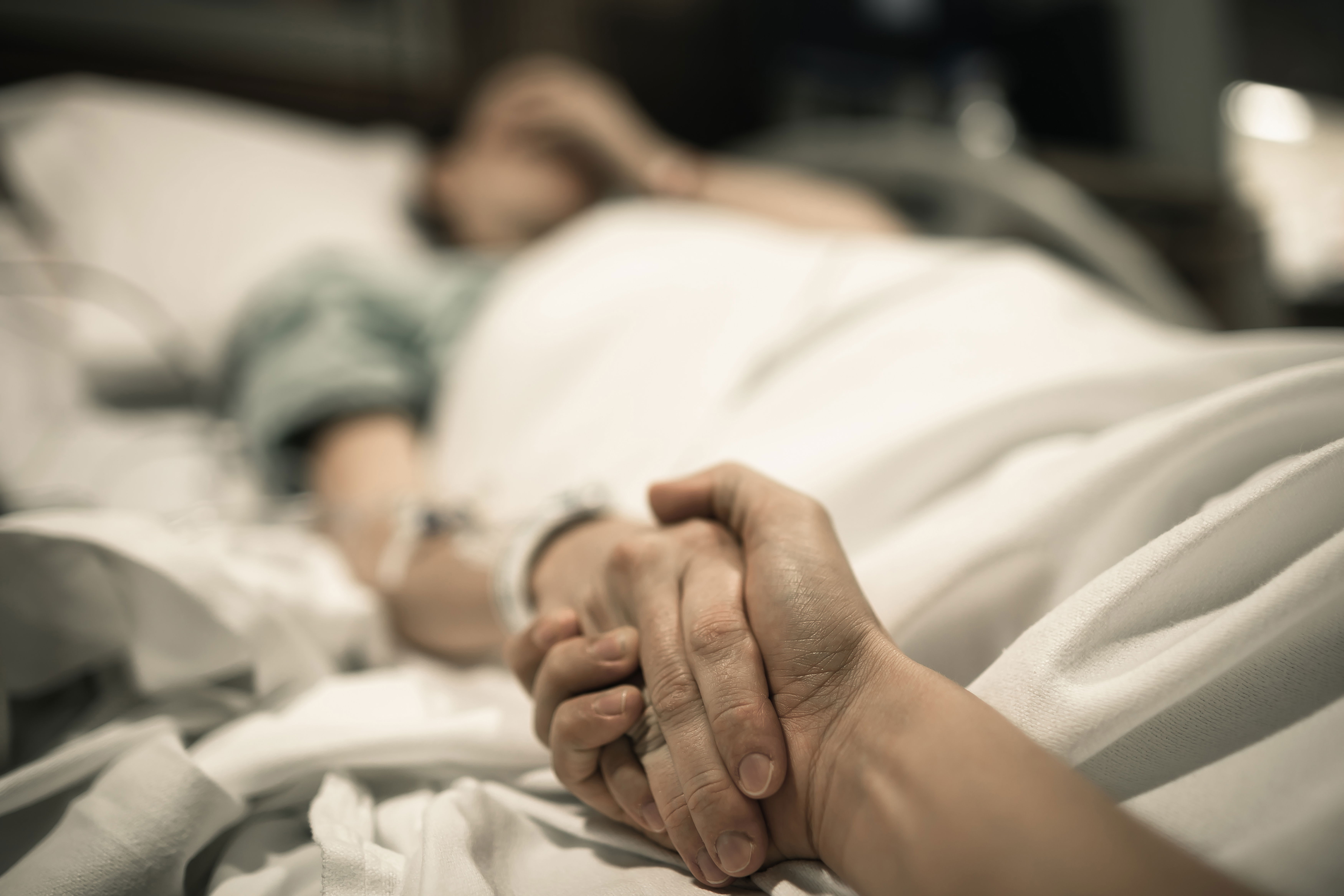The Horror of Hospice - a personal account


Warning: Some people may find this story upsetting
This story is an account of my up close and brutal experience of watching a loved one die in hospice care. I apologise in advance if you find it upsetting but I felt compelled to share the experience on behalf of my dear friend who now, sadly cannot.
Until recently I have only imagined wonderful things about our hospice services: caring staff, easing suffering, managing pain and discomfort, and holding people’s hands to their inevitable end of life. I also imagined homely surroundings, resembling residential care homes, protected from the stark and often scary clinical environments of acute hospital beds and wards.
Well, this Spring, my illusions were well and truly shattered as I watched my dearest friend waste away, distressed and uncomfortable, confined to a hospital bed and suffering a most undignified, prolonged and ultimately, lonely death.
This was in such stark contrast to the vivacious, energetic woman she had been, having established a very full life in a small coastal community over 7 years, contributing so much positive energy - everyone who met her never forgot her and felt uplifted by the experience, no matter how brief the encounter.
She created her dream beach-house-home – only 50 steps from the beach (she would frequently remind us), was a key founding member of an annual Festival, she set up Sunday morning yoga on the beach (to which she would attract anywhere up to a 100 participants!) and more recently financed and established a “Salty Sauna”, inspired by her frequent trips to Brighton.
Her energy, love of life and positivity infected those around her, no-one could control the instinct to smile and laugh in her company - sometimes at her (she really didn’t mind), she just wanted to share her joy of life and positive energy and didn’t care how it manifested.

Fast forward to 2024 and this amazing woman, the epitome of vitality, is no longer recognisable. Eaten away by cancer and her liver now failing, she is facing certain, but an unpredictably slow, death, and yet we cannot ease her passing. We tried to support her living in her spiritual home by the beach and sea that she loved so very much. A home that she had lovingly created as a meditative sanctuary and restorative retreat – her recharging station.
I had imagined a scene like that in “Beaches” where her last breaths and views would be outside with her dearest friends and the sun and salty air on her face. But, in reality, her end was to be the antithesis of this.
She was a very proud woman (rightly so with so many accomplishments), living alone, and fiercely independent she did not want anyone living with her. So, despite our offers of care and support in her home, she eventually admitted that she was too frail to be home alone and wanted to be admitted to hospice care. She believed she would be more comfortable and less afraid with 24/7 support from those that are trained and experienced in terminal illness and palliative care.

She had shared with me the importance of being at home, so I was very surprised to read on her emergency care and treatment plan that one of her biggest fears was dying at home. However, she also made it clear that she wished to avoid acute hospital admission, and the things she stated as of most value were “comfort and quality of life.” Hold these thoughts as you read on because they have haunted me, and upon reflection, I believe we failed her on most counts.
So, on a Monday in Spring 2024, following a radically rapid decline over the preceding week, our dear, wizened friend was collected by ambulance and taken to a community hospital “hospice”.
The friend that was visiting her at the time helped her take some home comforts, imagining a private, comfortable room to personalise and make feel like home for her remaining days - the clinicians having confirmed, and we could see, that she would not be returning home.
As close friends we were somewhat relieved to now believe that she was going to receive the very best palliative care from professionals experienced in dealing with such a demise. We all breathed a sigh of relief at not having to worry about her alone and scared in her home and at risk of falling down her steep stairs or being in pain, nor would we remain in a heightened state of fear and anticipation of having to respond to an urgent cry for help.
However, the hospice environment was not as imagined, rather it was a private acute hospital bed with ensuite. It was one of six such beds on a rehabilitation ward, extremely clinical in look and feel and hardly conducive to a peaceful, final few days. But at least she had a private room with private WC so was able to retain some independence and privacy. Unfortunately, after a day or two, she was requiring assistance to the toilet too frequently, so the staff fitted a catheter. This meant that she was now absolutely confined to her hospital bed. Staring at the blinds that the staff insisted on closing despite there being a rather pleasant garden beyond.
Our beloved friend’s only living relative was her sister who lived a two-hour drive away. Their wonderful mother having passed away a year and a half before. We were all thankful for that small mercy, knowing how devastated she would have been to lose her wonderful vibrant daughter and watch her desperately sad and helpless decline.
The sister had planned to visit the following week, having not seen her recently, she was unaware how frail she now was. We encouraged her to visit sooner not believing (and rather hoping by this stage) that she would not be with us a week hence.
So, her sister arrived on the morning of day 3 in Hospice, (having neglected to let us know when, so we could spread out the visitors). Therefore, I and another close friend arrived at the hospital to find her and her daughter at the bedside, sobbing over their relative and feeling dreadfully sorry for their loss.
They stayed for a couple of hours before announcing their departure back home as they had set off early that morning and needed to get back. They said they “had said their goodbyes and now nature needed to take its course”. They left the hospital approximately two hours after their arrival and having retrieved our friend’s house keys, car keys and wallet from her locker, and mobile phone from her bedside (and personal effects from the room it later transpired), said they were off to talk to the funeral directors – somewhat stunned I pointed out that our beloved wasn’t yet dead!
Another friend and I returned to her bedside only to find unknown visitors with her, which she would have absolutely hated. She had quite deliberately said her goodbyes in her uniquely vivacious way at her various clubs, always careful to be remembered looking healthy and as the person she really was. At this point I spoke to the hospice about “gate control” as there had been none. They also insisted on leaving the door to her room propped open so they could see her from the nurses’ station along the corridor. Unfortunately, this meant that everyone could see her, and she could hear the chatter, laughter and banal conversations emanating from the area as well frequent 'walks and gawks' from the rehabilitation patients that also occupied the ward and needed to practice their mobility.
So, all we could do now was watch our friend’s skeletal body, slowly and agonisingly give up its fight for the life she had loved so very much. The cruel irony being, at only 59 years old and fit and healthy her whole life, her organs were not going to give out so easily.
By now our dear baby-haired friend was completely yellow, with a bloated belly resembling late pregnancy, itchy skin, pain around her liver and where her skin cancer had spread and turned to leather, unable to eat and speak more than the odd word and her breathing was very laboured at around 11 breaths per minute (normal is 20). Such a contrast to the fit, energetic, beautiful woman with voluptuous dark curls, that she had always been – I felt the urge to walk around the ward with photos of the real her, aghast at how the person in front of me bore no resemblance to the person I and everyone else knew.
On her second day in hospice, she was groaning with every exhalation, unable to tell us if she was actually in any physical pain although clearly in some distress at the torturous end she was having to endure. I met with the doctor (who was fabulous), clearly sincerely compassionate but having to adhere to strict rules around palliative care. He assured me they would do better with gate keeping and would do their best (within their powers) to keep her comfortable. I stressed the importance of contacting me with any change as I was the only person close by and did not want her to die alone. He asked to see photos that depicted the friend we were describing, genuinely interested to see and appreciate her as we all did.
The night before she died, I sat with her for 4 hours, holding her hand and prompting the staff to keep on top of her medication. By now, she was unable to say anything resembling words and lay motionless with one eye half open staring, pleadingly at me, I believe she was questioning how such a close friend could sit and watch her suffer in this way – a way that she made clear she feared and desperately wanted to avoid. I will never forget that look, and my failure to help my friend at her point of greatest need. I am so dreadfully sorry for that.
I left that evening at 9pm and left clear instructions with the charge nurse to contact me should there be any change. By now I was willing her to die, to put an end to what was nothing less than torture. I would have stayed and in hindsight wish I had, but I needed to eat something and tend to my dogs at home alone. I double checked they had my details and were clear they should call me at any time and I would be there in 10 minutes.
That evening I ensured my phone was with me at all times, volume up, and I was ready to leave at a moment’s notice - convinced (and hoping) that her cruel demise was imminent. There were no calls before I went to bed. I managed to get some sleep and checked my phone immediately on waking for any missed calls or messages. There were none.
I was preparing myself for my next bedside shift at the hospital when I received a call from the friend that lives 5 hours away, the hospital had called the sister and the wrong friend to inform us our beloved had died. I prepared myself for the final drive to the hospital to kiss my dearest friend goodbye and collect the remaining personal affects.
So, after three nights and four agonising days in hospice-hell, she finally achieved the multiple organ failure we had all been waiting for on the morning of day four. The staff could not be sure of the time, despite telling me they were with her at the end. I strongly suspect that the morning shift found her dead, zombified body when they took over shortly after 8am, hence giving me an approximate time of 8.45am (which it could not have been as we had been informed by telephone before 8.30am). This would also explain why they ignored my instructions to call me first (because they had not been checking in on her), and instead telephoned her sister with the news that she had died. Her sister duly asking them to call the closest friend (which they managed to get wrong too).
I braced myself for what I was going to find on arrival at the hospital, struck by the reality that I would be her final visitor and would need to remove all traces of her from the room that we had tried to make homely for her final days. I was pleased to find that the staff had placed the colourful scarf that I bought for her a few days before, over her body. She was so pleased with that scarf, grabbing it with both hands and holding it to her chest. She kept it on her until she died.
I felt the need to sit with her for some time to have it sink in, but it did not. The dead body in front of me was a far cry from the person I knew and had loved, it was a stranger’s corpse, mouth open, teeth protruding, eyes closed and sunken in their sockets and chin up - searching for that last breath. A body that looked as though it had been dead for days or weeks, not hours.
I messaged friends that had been asking after her with the double-edged news. I really only wanted to remember the person that we all knew and loved, that is what she would have wanted - a warrior woman, a picture of vitality and spreader of positive energy. Despite the horror of her last days, that should be the enduring memory of this 'candle that burned twice as bright but half as long'.

Upon reflection
The vision of my dear friend's corpse and the one of her pleading, half open eye haunted me for days. How complicit was I in her suffering and what amounted to torture? How can we manage terminal illness so badly? How can we allow such systemic cruelty to be dressed up as “humanely managed” when it is far from so?
This experience has taught me that when people are very close to dying they lose agency and without friends and relatives advocating for them I suspect their passing would be all the more distressing and uncomfortable and even painful. We would not tie a dog to a tree and watch it starve to death, so why do we confine people to hospital beds and watch them suffer, waiting for their organs to fail? It is, frankly, barbaric.
We have a responsibility to represent our terminally ill, to share these horrific stories so people know the reality of palliative care in England and how our loved ones are forced to suffer in the absence of properly managed Euthanasia laws and policies. I felt compelled to write this account on behalf of my dear friend and many others that do not, by the very nature of the problem, live to tell their tales. We really must speak up for those that cannot speak for themselves (as we do our pets) and use our collective understanding, advances in medicine and lessons learned so we can properly and appropriately manage end of life when death is inevitable. An article written at the time of writing this account helpfully provides the current context and why I have chosen to use the term Euthanasia and not assisted dying in this instance.
Extract from an article in the Financial Times, by Charlotte Middlehurst, May 22 2024. “The right to control your death is a principle that societies have debated for centuries. But, as more countries prepare to legalise medically-assisted dying, the reality of allowing the practice is sparking fresh ethical arguments. Some form of assisted dying is now legal in 9 countries, as well as in 11 US states and parts of Australia. Parliaments in other countries are also considering such laws, including those in France and the UK crown dependencies of Jersey and the Isle of Man. This shift in the power of the state and the medical profession — over not only how citizens live their lives but also how they end them — is forcing difficult decisions, including the consequences of passing the laws so far.